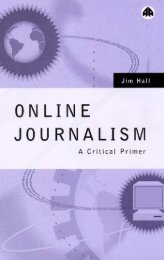Modul Mata Kuliah Journalisme Online - Ayo Menulis FISIP UAJY
Modul Mata Kuliah Journalisme Online - Ayo Menulis FISIP UAJY
Modul Mata Kuliah Journalisme Online - Ayo Menulis FISIP UAJY
Create successful ePaper yourself
Turn your PDF publications into a flip-book with our unique Google optimized e-Paper software.
Deggans: Sure. You can also warn other users that links provided by commentors may not be reviewed<br />
as carefully as the ones provided by the blog. Caveat emptor is the rule in such cases.<br />
ICT for Peacebuilding (ICT4Peace)<br />
Exploring the use of information and communications technology for conflict transformation<br />
Auteurs and amateurs: The debates on citizen journalism continue…<br />
April 15, 2007<br />
I find it interesting how a lot of discussions on citizen journalism are informed by what is possible (or<br />
not) from a US perspective. What is more disturbing is that authors both for and against citizen<br />
journalism rarely take into account developments outside the US (and the oft quoted examples of<br />
Europe and South Korea) that have resulted in mobiles, blogs and new media in general being used to<br />
create alternative voices that critique the sickening bias and partiality in mainstream media.<br />
Clearly, this new journalism has its problems – an inherent parochialism being one of them. The<br />
subjective, partial and provincial nature of citizen journalism, if we recognise it for what it is, isn’t<br />
necessarily proof that it is useless. As I’ve argued earlier, it’s precisely these individual viewpoints of<br />
citizens that the mainstream media, controlled often by interests that have their own parochial agenda,<br />
seek to marginalise and over time, erase. Standards matter – and the same standards that we ask for<br />
and seek, but rarely find in mainstream media, need to be instilled in citizen journalism that aims to be a<br />
cut above the dross that often colours individual blogs. However, the visceral and unpolished nature of<br />
citizen journalism is to me what gives it an edge over that which we generally see, hear and read in<br />
mainstream media – in stories that are raw and unsanitised by the cynicism, partisan bias or sheer<br />
boredom of journalists and Editors who have for too long controlled what we should consume, and how.<br />
To this end, it is necessary that we engage not just with citizen journalism as it is evolving in the US and<br />
more developed nations, but also how through mobiles, the growing availability and use of wireless<br />
internet and the increasing availability of PCs either through personal ownership or through cybercafes,<br />
citizens have access to platforms and media through which even if they are illiterate, they can share<br />
their stories.<br />
I’ve noted in an earlier post that it only takes one story – a single photo, a single podcast, a single mobile<br />
phone video – to change a regime and hold those responsible for abuses of human rights, and<br />
corruption, accountable. Initiatives such as Witness have shown us the way. This is citizen journalism in<br />
support of conflict transformation, good governance and democracy – a far cry from the essentially<br />
communitarian notion of citizen journalism prevelent in the US that is more about strengthening local<br />
voices. Citizen journalism in failing states, or in those that exercise repression, is also about securing and<br />
strengthening local voices, but is also about a restoration of civil order, the Rule of Law and democracy.<br />
This nuanced and global perspective is that which I find lacking in much of the online discussion I read<br />
on citizen media. Clearly, both sides have much to offer to the debate, and a naiveté of citizen<br />
journalism can get one into serious trouble (I should know). There are also significant challenges to
















